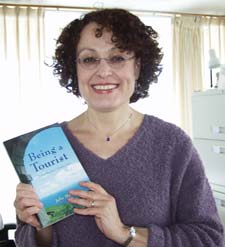

| Daily News | News Releases | Special Bulletins | Daily News Archives |
| The View from Trent | Trent Magazine | Focus Trent | Build 2000 |

Being a Tourist: Professor Julia Harrison explores the meaning of pleasure travel
 The "travel
bug" is a powerful entity. Once bitten, it becomes difficult to
imagine life without some component of travel and adventure.
The "travel
bug" is a powerful entity. Once bitten, it becomes difficult to
imagine life without some component of travel and adventure.
Trent University Professor Julia Harrison is fascinated with the issue of travel, tourism and the reasons why people seek out experiences abroad. She feels that thoughts and experiences about travel reveal much about human nature and the need to connect with others.
"I started my Ph.D. research asking the question of how Native Hawaiian culture was represented to tourists," explains Prof. Harrison. "I soon realized there was very little literature on the reasons people travel, or any analysis of the tourist."
It quickly became clear to Prof. Harrison that tourists don’t want to talk about their travels while they are on holiday. Instead, they are eager to discuss their experiences after they return home.
"I wanted to study upper middle class tourists, people who travel a lot," explains Prof. Harrison, adding, as background: "I did a lot of travelling myself as a young person and wondered sometimes about why I was doing it. Every year in Calgary - where I was a museum curator for 12 years - we had a lot of tourists in the summer and I was very intrigued by what experiences people were looking for."
In the mid 1990s Prof. Harrison placed an ad in the Globe and Mail, reaching out to people interested in discussing their travel experiences. Over 100 readers responded, and were mailed an extensive survey. Fifty-two completed surveys were returned, and Prof. Harrison proceeded to conduct lengthy interviews with over 30 individuals.
"I kept in contact with these individuals until 1998. They would send me postcards and copies of their travel journals, and we continued to meet and discuss their trips," says Prof. Harrison.
As she began to sift through all of the qualitative information she had gathered, Prof. Harrison discovered some common themes. While she is firm in the opinion that there is no "generic" tourist, she was able to confirm that many people travel for four reasons:
- as an opportunity for intimacy and connection
- as an expression of a personal aesthetic
- as a way to understand "home" and, relatedly, Canada
- as a way to personalize the global landscape
Prof. Harrison writes: "As much contemporary social theory informs us, any separation of the political, social, economic and moral realities of the touree and the tourist is simplistic, if not foolish and naïve. The entire nature of the touristic experience emphasizes the entanglement of the local and private with the global and public. The touristic experience is far from neutral, even though it is highly ambiguous and often contradictory."
Prof. Harrison’s research also delves into the impact of tourism on local economies, and the social responsibility of travellers to continue supporting various tourist economies. She investigates the explosion of travel in second half of the 20th century, and explores evocative themes, such as the idea of the journey, the metaphor of voyage, the idiom of exploration and the separation of home and away.
The culmination of Prof. Harrison’s research is a brand new book, published by UBC Press, called Being A Tourist: Finding Meaning in Pleasure Travel. Available at the Trent University bookstore, this is a fascinating read for anyone who enjoys travelling, and paperback versions of the book will be available in 3 - 4 weeks.
Posted April 7, 2003